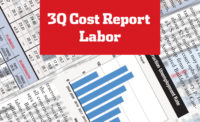Despite growing fear of a recession on the horizon, contractors continue to offer highly competitive compensation packages, approaching levels not seen in the industry in nearly two decades.
Aggressive salary and bonus offers are being made at a time of mixed market forces, where companies face a dire need to staff their projects, a dearth of available job candidates, inflationary pressures and the potential of a recession.
While employers are willing to dig deep to attract and retain qualified staff today, experts suggest the generous compensation trend could soon reach its limit. In 2021, average base salary raises for construction staff jumped to 4.2%, from 3.6% on average in 2020, says data from compensation consultant Personnel Administration Services. In its 2022 Construction/Construction Management Staff Salary Survey, employers predicted they would keep raises level at 4.2%.
But firm President Jeff Robinson notes that companies typically underestimate anticipated increases by 0.5%. He adds that high demand for talent coupled with inflationary pressures could push compensation to 5% heading into next year. That would be the highest average increase recorded by the survey since 2001, when the U.S. economy also faced a recession.
“As of today, contractors are still in the mode of needing to be competitive [on compensation],” Robinson says. “But once talk of recession gets bigger and bigger, that’s when it will level out, as companies start to protect their assets.” He predicts that average compensation increases could hit the 5% mark as early as October and remain at that level through year end.
The Personnel Administration Services survey shows that compensation varies significantly by U.S. region. In 2021, the northwest reported an average increase of 5.3%, New York-New Jersey at 5.1%, western states at 4.9% and the Rocky Mountain area at 4.8%. New England states reported an average increase of 3.5% and Great Lake states reported 3.8%. Between 2021-22, survey data shows project superintendents gained some of the highest compensation increases, averaging 6% nationwide.
Big Carrots
While employers need to offer existing staff handsome raises to retain them, contractors have to be particularly aggressive with compensation packages for new employees in a tight talent market, according to industry recruiters. The U.S. Bureau of Labor Statistics reported in May that there are roughly 1.9 job openings for every unemployed person in the U.S. Recruiters say that divide could be even wider in construction.
“From professional engineering through site supervision, there are huge shortages,” says James Huddleston, president of ProSearch Intl., a Grandview Heights, Ohio, industry recruiter. “I see quality, stable, long-term employees with top contractors who have been loyal now realizing that they hold all the cards in terms of interviewing and negotiations,” he says.
“As of today, contractors are still in the mode of needing to be competitive [on compensation].”
Jeff Robinson, President, Personnel Administration Services
As a result, Huddleston says nine out of ten placements he has made result in compensation offers with double-digit increases.
Superintendents tend to see the highest increases, followed closely by estimators. “I’ve placed a half dozen estimators in the last year who got at least 15% raises,” he adds. In some cases, Huddleston says estimators and more administrative employees, who do not have to consistently be on a jobsite, can work remotely.
“I have a Chicago client that allows some candidates to work remotely and come to the office for bid reviews,” he says. “The client pays a bit of a higher base salary, then uses the rest to cover travel costs to the office a few times per month. For the candidate, it offers a flexible schedule appealing to work-life balance.”
Jim Vockley, president of Adams Consulting Group, which specializes in AEC sector recruiting, says he also sees that balance, especially among younger candidates, as a potentially equal or larger draw than compensation.
“They may have taken jobs they are now sorry they took,” he says. “They see an opportunity to make the right move for them, even if it’s for a bit less money [than other opportunities].” Vockley says firms that land top candidates often do not provide the highest salary offer.
“Employers are more likely to attract a candidate with their benefits package—things like major medical coverage or maternity leave—which show how well they take care of their employees.”



Post a comment to this article
Report Abusive Comment